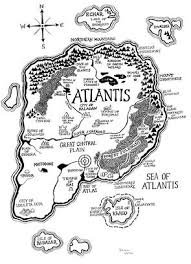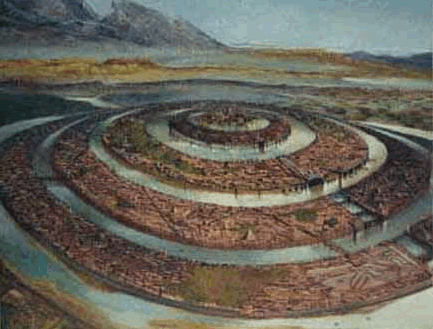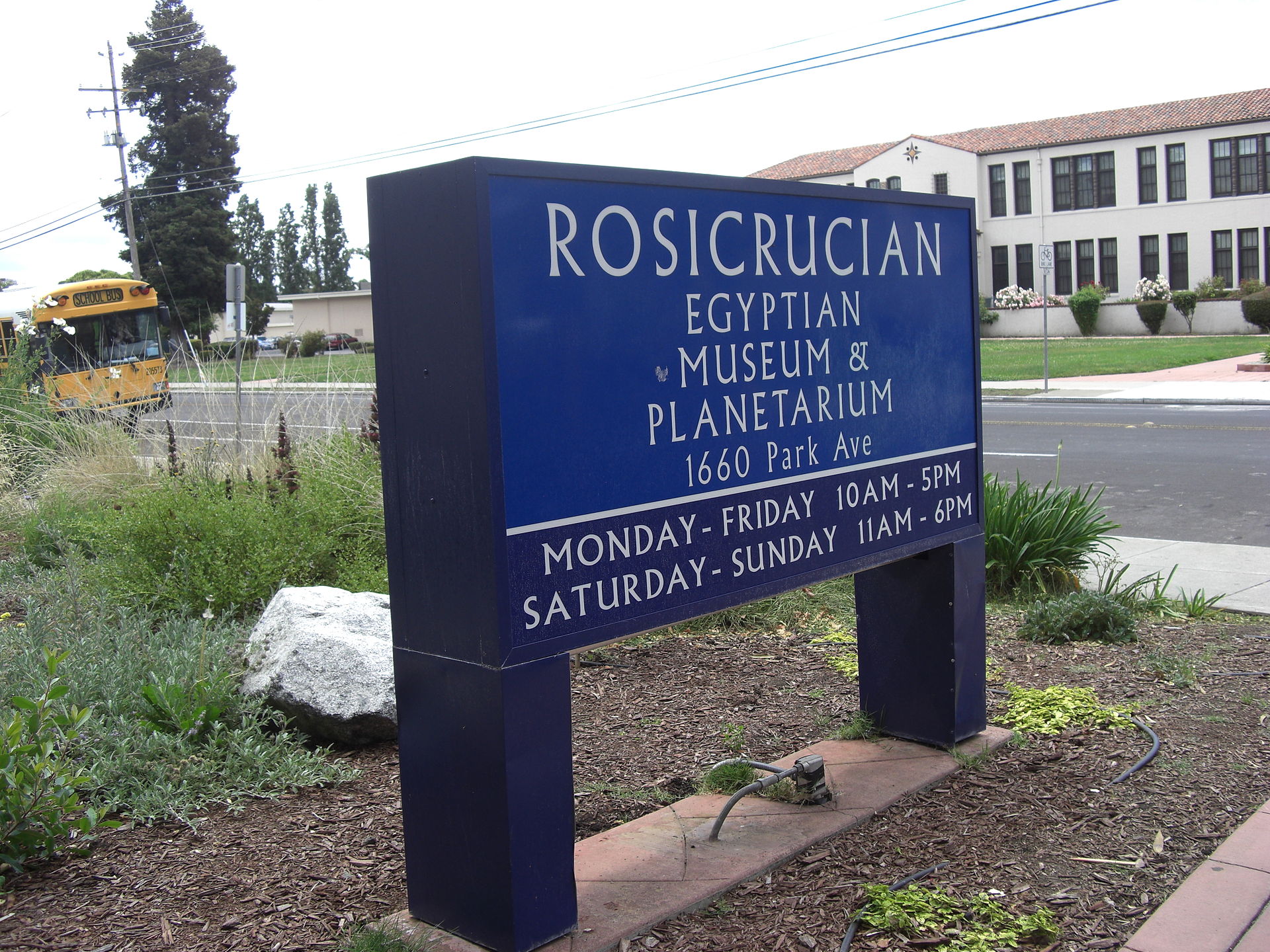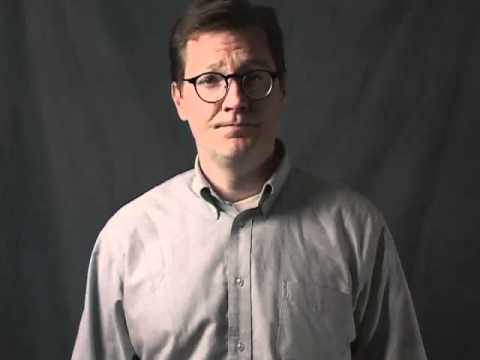‘Obsessive?’ ‘Obsessive!’ Yes, indeedy.
From little asides big myths grow. The sum total of human knowledge of Atlantis comes from a couple of pages in two of Plato’s dialogues, the ‘Timaeus’ and the Critias.’ These two are not in the first rank of Platonic dialogues. A great many admirers and readers of Plato have never heard of them.
The ‘Timaeus’ is a conversation set the day after the conclusion of the discussion of the ‘Republic.’ (Since there is no republic in it, for millenia pedants always wonder about that title. Answer: It was bestowed on the work by Cicero hundreds of years after Plato’s death. Cicero was not much interested in accuracy, think of him as a Fox journalist. No doubt it suited his purpose to have Plato legitimate a republic on the assumption that no one else would read the whole book.)
In turn, the ‘Critias’ continues the ‘Timaeus.’ In the few lines that mention Atlantis it is at a great remove from Plato. It is allegedly a story that an Egyptian told Solon hundreds of years earlier that is reported by one of the interlocutors. It mixes very specific details like the colour of building blocks, and the measurements of temple while being maddeningly vague about where the place was except for a reference that has been translated as ‘beyond the pillars of Hercules.’
What with all his labours, Hercules seems to gotten around the Mediterranean. Atlantologists have located the pillars at Gibraltar, Malta, Messina, Crete, Santorini, Morocco, the Crimea, and, believe it or not, Ireland. Yes, Ripley this really is ‘Believe it or not’ country.

Our cicerone is not quite right in that subtitle above. The book is not about his quest so much as that the other Atlantogolists he seeks and meets. Some he sought out in libraries and archives, and others on the internet, and he went to meet many of them in person. The book is a travelogue about the Atlantologists from Ireland, Germany, Morocco, Sicily, Greece, Malta, United States, Great Britain, and more. He had some travel budget did Mark.
The one place bruited as Atlantis that he did not visit was…. Antartica. Yes, Antartica has been identified by some as Atlantis, which drifted south after a cataclysm.
The tone is light and the prose snappy. While he is not a true believer in the Big ‘A,’ there are no cheap shots at those who do believe in Atlantis. This is no Bill Bryson hatchet job passed off as humour.
He does call the many interpretations of Atlantis ‘theories’ and that annoyed me because they are speculations, not theories. A theory joins evidence and analysis. Speculation is guess work without either.
The many ways in which Plato’s few lines are interpreted include, deciding that he meant 900 and not 9000, and the latter is a transcription error made by a scribe in ancient Egypt. Well, yes, it could be, and that scribe might have had red hair but however are we to know?
As for the ‘pillars of Hercules,’ every part of that is deconstructed and reconstructed to suit the desires of the speaker. ‘Pillars’ can refer to many things, far more than I ever thought. And Hercules, well he was several other chaps with the same name all over the place like John Smith. On it goes. The Wikipedia entry is a site of constant conflict. It changes every day as the Atlantologists slug it out on their keyboards.
When I first read the ‘Timaeus’ I thought the reference to Atlantis there was an undeveloped allegory on the hubris of peoples, not a road map. I took it to be a parallel of the Allegory of the Cave, and no one has yet set out to find that very CAVE. Silly me, once again I missed the point.
Some of the Atlantologists he met are safe, safe, and sober who discount the wild speculations of the many more zealous of their number, but find the subject fascinating. One of these triple esses (safe, sane, and sober) runs a web site: atlantipedia.ie.
Others are obsessive, no doubt about it. Any claim Mark Adams has to be being obsessive is bleached out by some of the characters he met. Among them are those that cannot make eye contact, talk in 45 minutes monologues and then lapse into catatonic states, talk to him through doors for security reasons (someone might steal my Atlantis map if I let anyone in). These are not in the safe, sane, an sober zone of inquiry.
Some promote a location, like Sicily, Santorini, or Malta, as Atlantis for purely venal reasons: it brings a few tourists (even if they are nut-cases, they pay hotel bills).
 One of many maps on the internet.
One of many maps on the internet.
Mixed in among these types are a collection of serious archeologists who are studying ancient ruins here and there and whose work, an Atlantologist thinks, has something to do with Atlantis. Huh? Well, goes the interpretation, these archeologists keep secret their interest in Atlantis, (a) because of the conspiracy of the rose (on this, see below) or (b) their funding would be cut if they admitted it. Maybe this is the paranoid side of the coin. Or (c) they foolishly do not realise the connection to Atlantis.
 One of many representations of a building on Atlantis.
One of many representations of a building on Atlantis.
Francis Bacon (1561–1626) called his little book in praise of science ‘The New Atlantis’ and in it speculated on what science could do to conquer nature and improve humankind. Because of the great powers of science for ill as well as good, Bacon imagined its use confined to a sect who worked with this secret knowledge for the good of all on an island. (Yes, this is the same Bacon who wrote the complete work of Shakespeare according to some….)
 Francis Bacon (I have seen this image passed off as Machiavelli more than once, believe it or not, Ripley.)
Francis Bacon (I have seen this image passed off as Machiavelli more than once, believe it or not, Ripley.)
Fatherhood followed. He sired, as so many have claimed, without knowing it, Rosicrucianism. This doctrine has followers today at your nearest public library, though they will not wear a rose on the lapel.
 The rose cross,
The rose cross,
Start checking out, reading, asking about books on Francis Bacon and the Followers of the Rose will ever so subtly make themselves known. They live and breathe conspiracy, arcane knowledge, numerology, and a lot else not to be found on the curriculum at a university. (Not yet, anyway. I omit Pepperdine, where shoe tying is an advanced course.)
 Where else? California near San José.
Where else? California near San José.
It is proof positive that Atlantis existed to the Rosicrucians that NASA named a space shuttle Atlantis. That was, they say, a coded message not only to Earthlings, but to aliens, as well. Gulp! Yes, there is an Erich van Donkey element to all this. The spell-checker changed the egregious Swiss hotelier’s name to Donkey and I decided to accept it as fitting.
Adams meets a few of the adherents of the rose along the way, nods a lot in agreement with them, hides in the bathroom to avoid others, and leaves town as soon as possible when he encounters a coven of them. Reading of his experiences made me wonder the Rosicrucians had never figured in ‘Midsomer Murders.’
Jules Verne, Walt Disney, Star Gate, an eponymous television series in 2013, and scores of others have made use of the name recognition of Atlantis, and in so doing have scattered its seed further, and by repetition perhaps planted it deeper. A google search returns a gazillion hits or 110,000,000 without even working up a sweat.
 Mark Adams
Mark Adams
Having made light of it all above, I must conclude by saying that Adams does shift the evidence and evaluate the arguments he heard, without denigrating anyone, and concludes, with a phalanx of qualifications, that the ancient city of Tartessos near Cadiz in Spain is the best candidate. That is, if there ever was an Atlantis. This city has a genealogy as Tartessos but perhaps Atlantis previously occupied the site before it was obliterated in a tsunami. As to the details Plato gives of colours and dimensions, these might simply be artistic touches of verisimilitude that can be dismissed. Hey, presto! We have arrived at Atlantis!
Thus inspired I re-read the ‘Timaeus’ and the ‘Critias’ to see for myself where the fire started. The reference to Atlantis is brief in the former and continued in some tantalising detail in the latter. In the ‘Timaeus.’ An Egyptian priest told Solon, who upon his return to Greece told Dropicles, who told Critias’s grandfather who told his grandson also named Critias. These four tellings span the two hundred years from Solon to Plato. That make me think of those ‘pass it on’ exercises in school. The teacher whispers in the ear of the first child ‘The sky is blue,’ now tell your neighbour and by the time it went around the class, the ceiling was falling. The morale of the story in that case was do not believe everything said.
The ‘Critias’ has all those details that have set Atlantological hearts a-pounding. Distance, dimensions, durations, depths, and more, all of which are well canvassed by Adams.
Reading it now the point of the story seems to me to this: As big and powerful and grand as Atlantis was, our noble ancestors, the Athenians, defeated them. Atlantis had all the wealth and power but this pre-historic Athens had all the virtue: they held all things in common, the warriors lived apart as warriors, features in the fictional city of the ‘Republic’ now given an Athenian pedigree and a track record of success. And why does not the Greek in the street know this already, why because a flood swept away Atlantis and most of Greece, too, so angry was Poseidon at the hubris of the Atlanteans. This devastating flood killed all the literate men who might have remembered or recorded the story, sparing only a few rude and crude mountain men from whose loins Athens was eventually re-populated. This flood stripped Attica of its topsoil and carved the Athenian acropolis out. End of story.
Get it? Atlantis was big and powerful but no match for a virtuous Athens. Athens was virtuous because no one there cared about gold, jewels, luxuries that the Atlanteans had in plenty.
Skip to content
